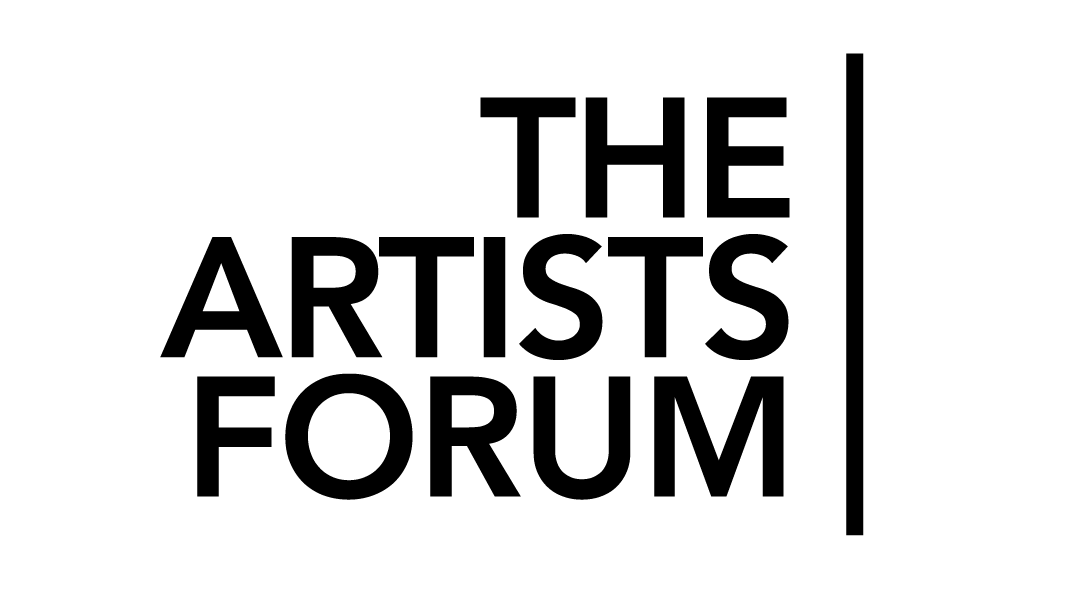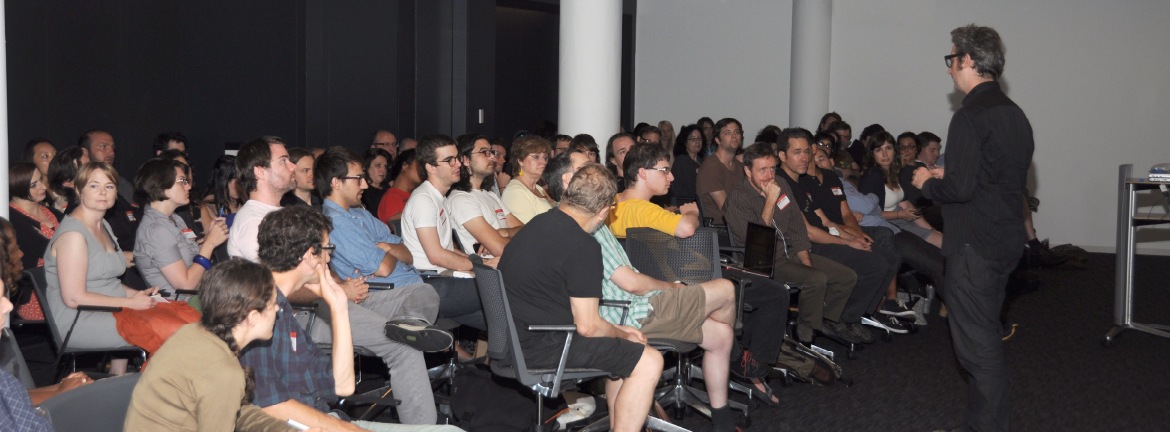Written by Jeremy Pesner for THE ARTISTS FORUM MAGAZINE
Edited by Amos White V for THE ARTISTS FORUM, INC
Photos: Courtesy of Arts, Culture, and Technology Meetup group
REVIEWER RATING:
5 out of 5 stars
ARTS, CULTURE, AND TECHNOLOGY MEETUP – OPEN SOURCE INITIATIVES
NEW YORK, NY (August 16, 2010) This summer, I attended an Arts, Culture, & Technology Meetup called Open Source Initiatives. This group discusses a number of different issues in the arts tech world, including interactive education, data visualization, and gaming. This particular event focused on open source: How Open Source technologies and Open Source mindsets contribute to arts technology.
The event was held at Edelman New York headquarters (250 Hudson Street, NYC). Four separate presentations were presented – each from a different perspective.


First was Gabriela Coleman, Assistant Professor at NYU’s Department of Media, Culture & Communication. She investigates the history and collaboration methodology of open source software. She began by illuminating the history of open source, with Richard Stallman’s growing dissatisfaction with the increasing amount of proprietary code being written in the late 80s. He founded the GNU Project, the first big open source project, and later subsidiaries like the copyleft movement and GNU license. When the web became popular and Linus Torvalds wrote the original Linux kernel, the Open Source movement suddenly became a worldwide phenomenon.
Programmers were able to apply their love of craftsmanship and lifelong learning to begin to develop many open source projects, including Linux, Apache, VLC, Wikipedia, the GIMP, and many more. Much of this software has found widespread personal and business use today. In particular, Gabriela investigated the community around the development of the Debian branch of Linux. The Debian Project is far more than a cobbled-together group of developers – there are project leaders, licensing guidelines, a constitution, a two week annual conference, and even a social contract. Without the robust guidelines and organization that open source projects like this have maintained, they likely would not exist today. The dedication and skill of those involved has made it possible for many artists to use free or low cost tools for their art projects, and encouraged them to share their work alike.
Next was Jeff Crouse, fellow at Eyebeam, one of New York’s premiere digital media centers. He spoke about Eyebeam’s use of open source software, Eyebeam’s policy regarding the openness of its own work, and different artworks and applications that have used open source frameworks. Eyebeam has the Open Lab, which develops artwork and code for GNU/Creative Commons distribution, and the Open Culture Research Group, which looks into various types of licensing and sharing models in order to most effectively distribute work while maintaining credit. It is also associated with events with similar goals, such as the Open Hardware Summit, an event dedicated to the discussion and proliferation of open source hardware, and Re:Group, which looks at how modern culture has become participatory.
Jeff’s works include iPhoneOpenCv, an iPhone application built on OpenCV, an open software framework for computer vision, and Earthify, a tool to map apartments for sale on Craigslist to Google Earth. Additionally, Jeff detailed some applications of OpenFrameworks, a C++-based codeset for multimedia production. This included projects like various types of installations and games, as well as an event called the World Series of Tubing. Jeff also espoused the “hacked ethic” which is prevalent at Eyebeam. Hackers believe that software can produce art, and also that people’s lives can be enriched by software. One thing was certain from Jeff’s presentation – the use of open source in and around the arts community is thriving and significantly beneficial.

After that, the duo Zeeshan Lakhani and Russ De Moose of the Liberty Science Center, presented on the Museum Open Source Code and Application Repository (aka MOSCAR). MOSCAR is being developed as a repository for open source code, applications, and modules, primarily for the museum and learning communities. MOSCAR also intends to avoid common pitfalls of open source software, including the need for the users to configure it themselves and the lack of a reliable entity to turn to for support, especially if one is not technically inclined. As Zeeshan and Russ explained, users should be able to download a fully functioning program and use it right away, and also create a dedicated community to assist with support and further development. MOSCAR will integrate with many existing services, like GitHub, Forrst, wikis, forums, and more.
MOSCAR will provide a profile page for each submitted project to have citations, examples, and more. Projects will be rated on their usability and functionality, and MOSCAR will also possess advanced search capabilities for users seeking specific applications. So far, it is only the two of them working on development, but they have applied for a grant from Creative Commons and hope to gain increased momentum soon. However, one thing they made clear is that MOSCAR is by no means limited to museums – anyone working on an open project with an educational element has something to gain from MOSCAR. Who knows? Your art may wind up in the Liberty Science Center’s next big display.

Bre Pettis, founder of the MakerBot company, was the final speaker. MakerBot is a 3D printer – users can design schematics for small plastic objects and “print” them on the MakerBot. MakerBot is fully open; the hardware is available as DIY, and the software is open source. The company makes money by selling preassembled units. One big advantage of this open culture is that users are free to help the company improve the product. Bre told the story of one MakerBot user who noticed that their algorithm to keep the cutter at a constant average temperature was highly inefficient, so he wrote a better one. He shared it with the MakerBot company, and now it’s included in their standard software.
This has led Bre to be very optimistic about the future of MakerBot, 3D printing, and Open Source in general. It’s not unreasonable to imagine that users can write new software to assemble electronic boards, carve wood or even metal. It fosters peer mentoring and a shared sense of accomplishment. After his talk, he demonstrated the printer for the attendees, and we were able to watch as it created all sorts of plastic trinkets, from bottle openers to toy space invaders. That hardware stood in strong testament to the power of communal open source.


Julia Kaganskiy, the founder of the meetup group, briefly took the stage to advertise her new initiative: Project Matchmaking. She is taking submissions from artists and organizations who are working on some sort of tech-based project (MOSCAR has already been submitted), and recruiting programmers on the other side to match with them. Though this will be largely a volunteer effort on their part, she is searching for some funding so that programmers can receive some compensation.
I was very satisfied with this event. The questions of open source have been significant throughout the history of programming, and it was refreshing to see the question tackled from many unique angles. The speakers were well prepared and engaging with interesting demonstrations and stories, and were happy to speak with me and provide me with their presentation materials for this article. I would encourage anyone interested in the Arts, Culture & Technology meetup group to join on meetup.com, and anyone interested in any of these projects to contact their respective presenters (they’re all easily searchable). I look forward to the next event.
For more information about Arts, Culture, and Technology Meetup, visit: meetup.com/Arts-Culture-and-Technology

